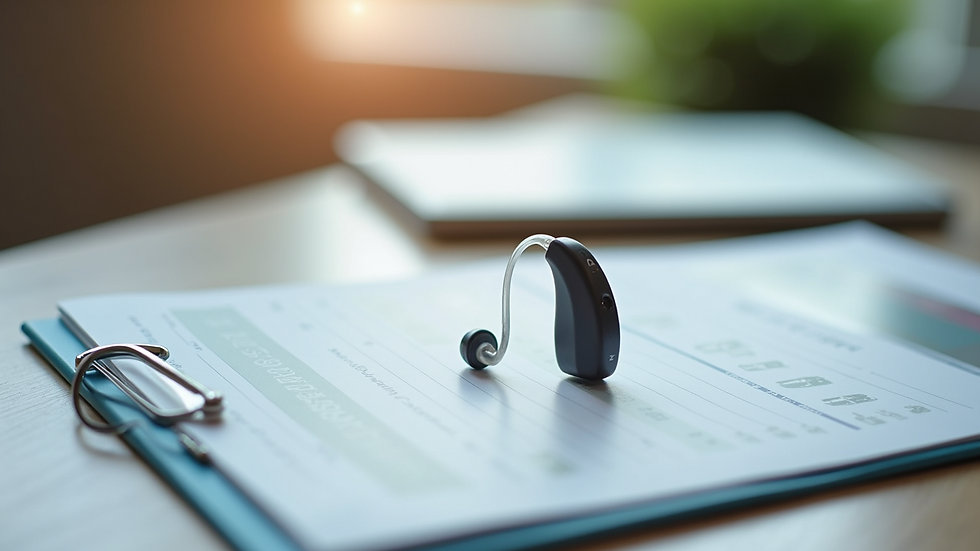How to Choose the Right Hearing Aid for Your Needs
- OPTIMUM HEARING CARE

- Aug 19, 2025
- 3 min read
Hearing loss can affect anyone at any age, and choosing the right hearing aid is essential for improving your quality of life. With so many options available, it can be overwhelming to find the perfect device that fits your lifestyle, budget, and hearing needs. This guide will walk you through the key factors to consider when selecting affordable hearing aids, helping you make an informed decision.
Understanding Different Types of Affordable Hearing Aids
When it comes to hearing aids, there are several styles and technologies to choose from. Knowing the differences can help you pick the right one for your specific hearing loss and daily activities.
Behind-the-Ear (BTE): These hearing aids sit behind your ear and connect to an earmold inside your ear canal. They are versatile and suitable for mild to profound hearing loss.
In-the-Ear (ITE): Custom-made to fit inside your outer ear, ITE hearing aids are less visible and easier to handle.
In-the-Canal (ITC) and Completely-in-Canal (CIC): These are smaller devices that fit partly or completely inside the ear canal, offering a discreet option for mild to moderate hearing loss.
Receiver-in-Canal (RIC): Similar to BTE but with the speaker placed inside the ear canal, providing a natural sound experience.
Each type has its pros and cons related to comfort, visibility, battery life, and sound quality. For example, BTE models often have longer battery life and more power, while CIC devices are less noticeable but may have shorter battery life.

Where to Find Affordable Hearing Aids
Finding affordable hearing aids does not mean you have to compromise on quality. Many providers offer budget-friendly options that still deliver excellent performance. It’s important to shop around and compare prices, features, and aftercare services.
When evaluating options, consider:
Warranty and service: Ensure the provider offers a warranty and follow-up support.
Trial period: Look for a trial period to test the hearing aids in your daily environment.
Customization: Hearing aids should be programmed to your specific hearing loss for the best results.
By focusing on these factors, you can find affordable hearing aids that meet your needs without breaking the bank.

How do you get hearing aids when you can't afford them?
Hearing aids can be expensive, but there are several ways to obtain them even if you have financial constraints.
Insurance and Medicare: Check if your health insurance or Medicare covers hearing aids or related services.
Government programs: Some states and local governments offer assistance programs for hearing aids.
Nonprofit organizations: Groups like the Hearing Loss Association of America or Lions Clubs provide resources and sometimes free or discounted hearing aids.
Payment plans: Many hearing aid providers offer financing options to spread out the cost.
Discount programs: Look for discounts through veterans’ programs, senior centers, or community health clinics.
Additionally, some providers offer refurbished or gently used hearing aids at a lower cost. These devices are professionally tested and can be a great option for those on a tight budget.

Key Features to Consider When Choosing Hearing Aids
Selecting the right hearing aid involves more than just price and style. Here are important features to evaluate:
Sound quality: Look for devices with noise reduction and feedback cancellation to improve clarity.
Connectivity: Many modern hearing aids connect to smartphones and other devices via Bluetooth for streaming calls and music.
Battery life: Consider rechargeable models for convenience or traditional batteries if you prefer.
Comfort and fit: A proper fit ensures comfort and prevents the device from falling out.
Durability: Choose hearing aids that are water and dust resistant if you lead an active lifestyle.
Adjustability: Some hearing aids allow you to adjust settings manually or through an app.
Try to prioritize features based on your lifestyle. For example, if you spend a lot of time on the phone, Bluetooth connectivity might be essential. If you are active outdoors, durability and water resistance are key.
Tips for Maintaining Your Hearing Aids
Proper care can extend the life of your hearing aids and keep them functioning well.
Clean regularly: Use a soft, dry cloth and avoid moisture.
Store safely: Keep them in a protective case when not in use.
Replace batteries: Change batteries promptly to avoid damage.
Schedule check-ups: Visit your audiologist for regular maintenance and adjustments.
Avoid extreme temperatures: Keep hearing aids away from heat and cold.
Following these simple steps will help you get the most out of your investment.
Making the Final Decision
Choosing the right affordable hearing aids is a personal process that depends on your hearing loss, lifestyle, and budget. Take your time to research, consult with professionals, and try different options. Remember, the goal is to improve your hearing and overall quality of life.








Comments